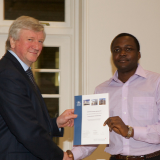Psyched Up (2017) Book Summary and Insights
Book Title: Psyched Up
Subtitle: How the science of mental preparation can help you succeed
Publication Date: 2017
Author Name: Daniel McGinn
Book Summary
McGinn covers the subject of mental preparation in the most easy, informative and applicable way. From pre-performance rituals to why group rallies are effective, he makes points that apply to business people, athletes and performers. Although he does not give specific, direct advice on “how to do it”, he instead takes a more roundabout approach, citing study results and quotes from people in the field.
No matter the work of life we are in, our ability to perform is ultimately judged in one crucial moment, and McGinn takes readers through how to be our best selves in that moment.
Who is This Book For?
This book is for anyone who suffers from debilitating anxiety attacks before a performance.
Athletes, business people and performers looking to work through their anxiety by finding their centre.
About The Author
Daniel McGinn is an acclaimed journalist for Harvard Business Review and author, who has appeared as a guest on shows like NBC’s Today Show, CNBC and the CBS Morning Show. As a writer, his work has appeared in magazines including The Boston Globe Magazine, Wired, Inc and Fast Company. He is the host of an advice podcast, Dear HBR.
He is the author of another book, House Lust: America’s Obsession with our Homes (2008).
Buy Book: Support The Book Author and Our Work
Great books should be read, studied, and reviewed frequently, so reading the actual book may provide more value to you than the book insights on this page. Besides, this would support the work of the book author and what we do on LarnEdu. What could be better?
Important Notes
We get a small compensation from Amazon when you visit your nearest/local Amazon site via our affiliate link to purchase an item within 24 hours or if you add it to your cart and checkout within 90 days. This is no additional cost to you and supports our work.
The information on this page is meant to supplement the actual book(it is not a book review but distils the key insights or ideas from the book in under 5000 words). The content creator or LarnEdu does not necessarily support the views, thoughts, and opinions expressed in the text/book. Reasonable skepticism should be applied with any views, thoughts or opinions expressed/shared by the book author or content creator.
Reading the contents of this page does not guarantee specific results. The best lessons are achieved from taking consistent action in the real world rather than being addicted to the illusion of progress by getting stuck on reading an infinite amount of books or book summaries and insights. LarnEdu and the content creator accepts no responsibility or liability for the accuracy of the information on this page or how it is used.
Book Insights

Introduction
Everyone has felt it at least once; the nervous flutters, the stammering, the rush of blood through your veins — all signs of nerves before a big show. It could be anything from a presentation before your class to a sports performance before crowds of avid fans; whatever the event, the nerves still hit.
The author uses real-life experiences from a mix of people—sports and businessmen – to give the audience real life instances where pre-show rituals, superstitions and nerves have helped.
Although this uses relatable instances and easy-to-follow insights that readers can follow, McGinn ends on a slightly controversial note, selling performance-enhancing drugs.
Anxiety Attacks and Pre-Show Rituals
Anxiousness before a big event is as common as pre-show rituals. It hardly matters you’re preparing for; a job interview or speech. Our body naturally reacts to stress with a flight or fight response with an increase in adrenaline, which alters our heart rate and blood pressure.
The lengths people go to when dealing with anxiety and nerves would shock you; in 1981, musician Carly Simon had to put her show on hold to deal with her nerves on stage after an anxiety attack.
The author volunteers that a better way to deal with stress would be through “reappraisal”—a method that asks for you to announce your feelings positively before a performance. For example, when feeling jittery before a show, you can say out loud “I’m so excited, this is great” rather than staying calm and silent or announcing your nervousness.
Pre-show rituals are another way to ease the tension before a performance. Anxiety does not leave sports athletes out of the fray, as studies have shown that even some of these hard guys have their own pre-performance rituals, which improves their performance. An example is a study conducted where participants separated into groups and organisers asked some teams to go through pre-game rah-rahs and others read an article.
They noted the teams that went through the team spirit chants to have performed better than their counterparts.
Another study found golfers performing remarkably better after being told that their golf clubs had once belonged to famous golfers; better than their counterparts who were not told anything.
Operating at Peak Efficiency
Psyched Up inspires readers to rethink their mental preparations when facing life’s crucial moments; including how to deal with adrenaline and optimise emotions.
Daniel Kahneman, in his book, Thinking, Fast and Slow, tells readers that our brains work in two ways—fast and slow. We can attribute our reflexive actions to the fast side of our cognitive system working, while our brain shelves the concentration-requiring thoughts with the slow system.
With the categorisation of our reactions into these two systems, it is easy to see how with the “fast” system, we are more cool in situations. It could help during an anxiety giving event if you begin with an off-hand, familiar speech, before delving into your main point.
The key to making the most of these systems is to know how and when to smoothly switch between the two.
Pep Talks and Music
The aim of a pep talk should not just be to rally up participants or incite emotional reactions. McGinn cites studies in the military which show how the effectiveness of pep talks before a battle.
Rather than reminding participants of what is at stake or how many eyes are on them, it is more effective to remind them of their ability to execute, the fundamentals of the game, and their reason for being there. The author titles the chapter he talks about this “Win One for the Gipper”, and says that these pep talks might be short but, more effective in boosting performance.
However, the author allows that some situations call for emotional appeals with pep talks. A study conducted by Tiffany Vargas showed that a fact-based talk is more helpful for sports teams facing new opponents and, fiery talks are more effective for championship matches.
What does music have to do with physical performance? Research has discovered that pumping yourself up on motivational music before a performance does much to improve your psyche and even performance.
Unsurprisingly, one of the more popular songs chosen for pre-performance boosts is “Eye of the Tiger”. Listening to this music before performance does more than just set you in a good mood—it pumps you up, increasing your heartbeat and tensing your muscles.
Also, playing music while you workout may reduce the stress of the act. This is because our bodies move in sync to the music playing, causing a calming and energising effect. This will make the workout less exertive.
Healthy Competition
We’ve all had our fair dose of the competitive streak. And while excessive competitiveness might prove unhealthy, we need the drive to push us sometimes.
Experiments conducted in the 1890s discovered that when cyclists were categorised in unpaced, paced, and racing races, the results were different. Cyclists who got placed in competitive races cycled on an average 40 seconds faster than the unpaced cyclists.
Research from Gavin Kilduff found that when they pit teams against known rivals, they perform better.
Take this study into the business world and see how T-Mobile CEO, John Legere boosted his company sales with a dose of healthy rivalry. Legere used unorthodox methods to revive T-Mobile sales and incited a public rivalry with their major competitors; AT&T and Verizon. His bids for attention paid off with T-Mobile subscribers and stock price increasing.
Performance-Enhancing Drugs
Performance-enhancing drugs have earned a bad rep for being dangerous with prolonged usage but, do they really deserve that reputation?
They’re mostly considered in relation to hardcore athletes and fitness enthusiasts looking for an edge in what they do. But, performance-enhancing drugs are being used today for anxiety and stress attacks. An example is beta blockers such as propranolol; medicine supposed to reduce the body’s blood pressure, allowing you deal better with an adrenaline rush.
These drugs come with their side effects but for people whose careers are threatened by their anxiety attacks, are of a necessary evil. Some side effects include tightness in the chest and blurred vision. However, users are usually too relieved that their attacks are over to concern themselves with the side effects.
Although the author cites more instances where these drugs like Modafinil and Ritalin have helped save a career on the edge of death, it is important to note their side effects. More serious effects of these drugs could occur in the form of addiction, and psychosis.
If you are thinking of using, or already using, performance-enhancing drugs, note the pros and cons McGinn talks about in this book. Or, you may find that some other method talked about in this book is effective for you.
Key Quotes
Still, high school sports gave me a window into the psychological techniques coaches used to prepare us (and the players used to prepare themselves) in the final moments before a game. like most teams, ours relied on specific music to rev us up; when i hear those songs thirty years later, my pulse still quickens. Our teams had ritualistic pregame prayers and routines. The coaches worked to kindle a sense of hostility towards key rivals. we spent hours listening to pep talks aimed at instilling a sense of purpose.
Whether the performance takes place in a courtroom, a classroom, or a boardroom, and whether it involves a presentation , a negotiation, a sales pitch, or a job interview, we have just a few moments to collect our thoughts and prepare our minds. There’s no room for more practice.
Some performers develop creative techniques for dealing with the affliction. Carly Simon is an extreme and oft-noted example. In 1981, during a concert in Pittsburgh, Simon suffered an onstage anxiety attack so profound that she asked audience members to climb onstage to rub her arms to help calm her down, allowing her to finish the show.
Most of the chapters in this book are about psyching yourself up. But there comes a moment in life when it’s not about us anymore: It’s about the people we’re leading. We can’t do it for them. We can teach, encourage, prod, and cajole, but the outcome is in their hands. In the final few moments, all we can offer is a pep talk.
Still, nearly everyone feels anxious about public speaking. The racing heartbeat, dry mouth, and sweating that commonly afflicts public speakers is so widespread as to be normal. Medicine is a tool to treat sickness, but if nearly everyone experiences some of these symptoms when approaching a lectern, can anyone who’s nervous on a stage benefit from these medications?
Conclusion
Packed with real stories from different fields, Psyched Up is an engaging call-to-action on how performers can improve their performances with certain rituals, music and performance-enhancing drugs.
Packed with real stories from different fields, Psyched Up is an engaging call-to-action on how performers can improve their performances with certain rituals, music and performance-enhancing drugs.
Packed with real stories from different fields, Psyched Up is an engaging call-to-action on how performers can improve their performances with certain rituals, music and performance-enhancing drugs.
Since You’re Here …
Great books should be read, studied, and reviewed frequently, so reading the actual book may provide more value to you than the book insights on this page. Besides, this would support the work of the book author and what we do on LarnEdu.
You can also support the work we do at LarnEdu work by making a one/off or monthly donation(via PayPal) for as little as £0.99 or sharing this content.
Do you have any feedback or suggestions? Use the comment section below or send us a message.
Content created by: Tracy















